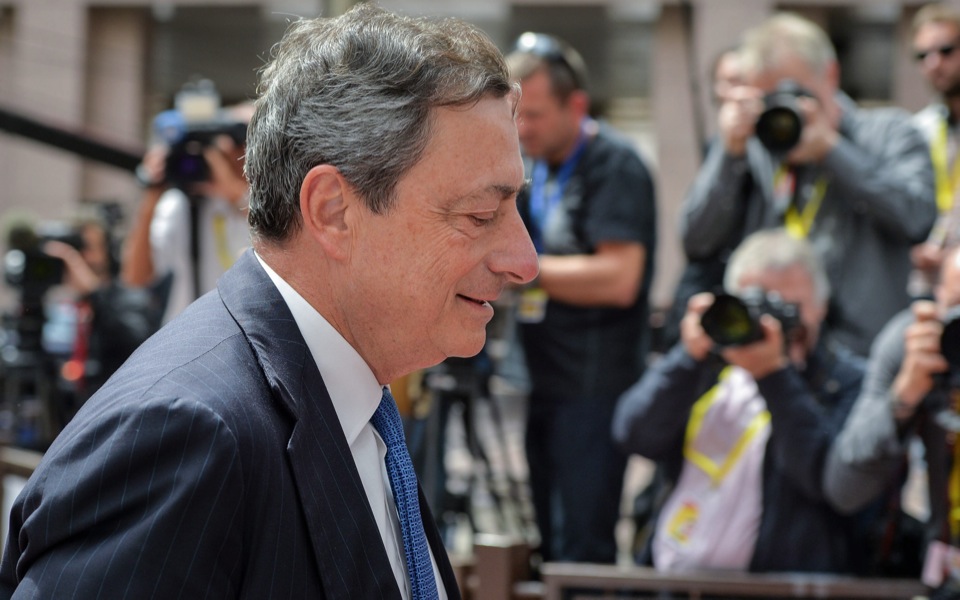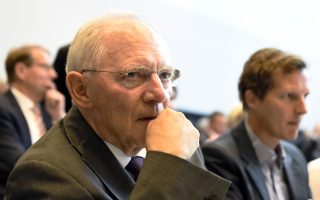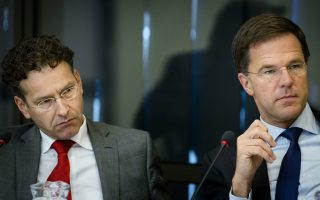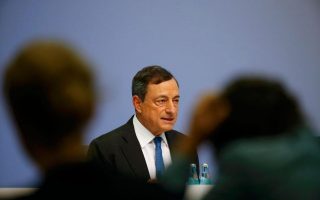Draghi dreams of better union as Europe bickers over Greece

The founding fathers of the European project wanted an “ever-closer” union. Mario Draghi says the immediate goal should be one that’s less imperfect.
Attempting to move forward after the political squabbles that almost — again — ended with a rupture in the euro area over Greece, the European Central Bank president is making a plea for deeper regional cooperation. The trouble is, the renewed bout of turmoil has done nothing to encourage countries to travel that path.
Draghi and the European Union’s top bureaucrats want to overcome the contradictions of 19 sovereign countries using one currency and rejig the bloc to rule out recurring debt crises. Speaking in Frankfurt on Thursday, he cited a report he co- authored with the four other “presidents” of the EU to say nations must move toward fiscal and political union.
“This union is imperfect, is fragile, is vulnerable, and doesn’t deliver — at the very least doesn’t deliver all the benefits it could if it were to be completed,” Draghi told reporters after the ECB approved measures to help ensure the survival of the Greek banking system. “The future now should see decisive steps on further integration.”
Shared treasury
Draghi, European Commission President Jean-Claude Juncker, EU President Donald Tusk, European Parliament President Martin Schulz and Eurogroup President Jeroen Dijsselbloem, laid out a potential map for stronger European integration in the so-called “Five Presidents” report published last month.
The document laid out the possibility of a shared treasury for the region within 10 years. That meshes with the opening lines of the 1957 Treaty of Rome, which envisaged an “an ever closer union” which would “eliminate the barriers which divide Europe.”
Little of that spirit has been evident during the latest crisis, with political talks repeatedly breaking down, Greek politicians speaking of the humiliation of their nation, riots on the streets of Athens, and a willingness to countenance a Greek exit from the euro area.
German Finance Minister Wolfgang Schaeuble said on Thursday that “the better way” may be for the country to temporarily leave the single currency.
In an interview with Europe 1 radio on Friday, Schaeuble’s French counterpart, Michel Sapin, said he’s “radically against” that plan and that “nothing can happen” in Europe if France and Germany disagree.
‘Long-lasting damage’
“The political schisms within the eurozone are sufficiently wide that it’s going to be very difficult to move the process forward,” said Peter Dixon, an economist at Commerzbank AG in London. “Deep and long-lasting damage has been caused to the structure of the eurozone.”
The national truculence hasn’t impressed Draghi. He dismissed a question at his press conference on what he thought of Schaeuble’s remarks.
“I’m not going to comment on politicians’ statements,” Draghi said. “I only know what’s our mandate, and our mandate is to act based on the assumption that Greece is and will be a member of the euro area.”
The portents aren’t all bad. In a flurry of activity on Thursday, Greece’s parliament signed off the reforms needed for a bailout package worth as much as 86 billion euros ($94 billion), euro-area finance ministers agreed in principle on a 7 billion-euro bridge loan for the country, and the ECB’s Governing Council agreed to increase the level of emergency funding to Greek banks.
Sluggish economies
Even so, just as Draghi has consistently reminded the region’s leaders that they must improve the competitiveness of their sluggish, aging economies, now he’s telling them they need to make a leap of faith in sharing sovereignty.
“Draghi also provided a warning to governments that it cannot guarantee the eurozone’s future single handed,” said Ben May, an economist at Oxford Economics Ltd. “While the ECB appears prepared to do its bit to support the recovery and Greece, it has also upped the pressure on governments to do more too, to ensure the long-term stability of the region.”
Draghi said euro-area leaders will discuss the Five Presidents report in the coming weeks, and in any case the bloc is starting to integrate its banking system and capital markets.
Nevertheless, that technocratic endeavor isn’t carrying ordinary people along with it, according to Karsten Junius, chief economist at Bank J Safra Sarasin Ltd. in Zurich.
“The political infighting of the past weeks has harmed the political integration of the euro area; it will take a while to heal the broken bones,” he said. “Further risk sharing is not what the people in the euro area want.
Draghi was speaking more for himself then for the euro area.”
[Bloomberg]





